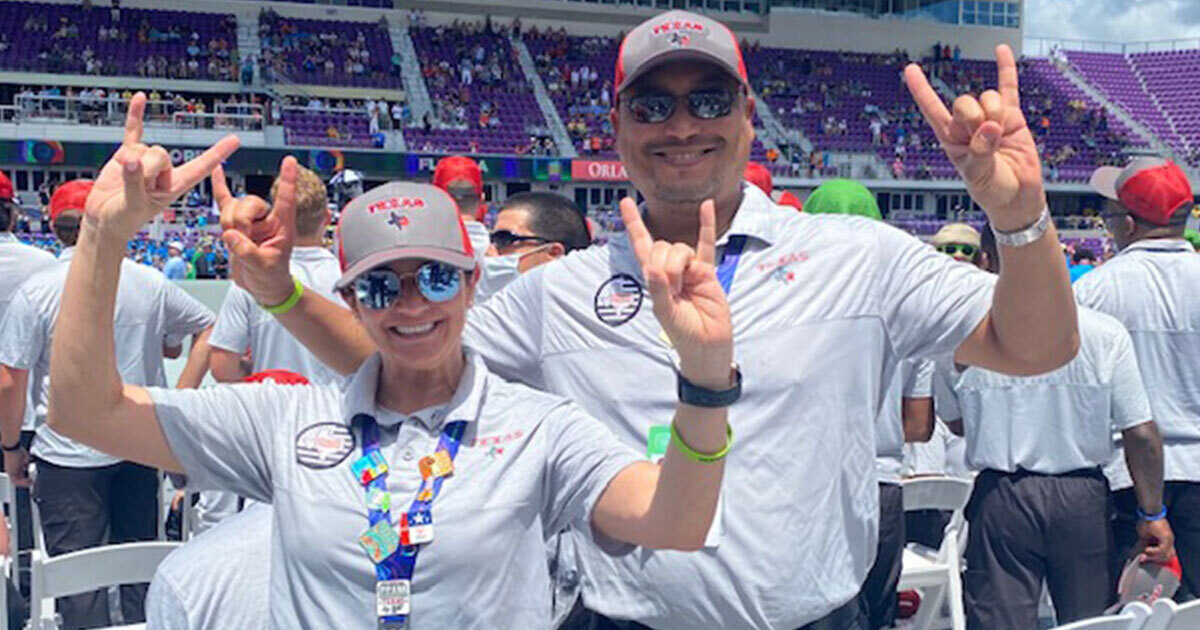Supporting Athletes with Disabilities
UT Health Austin sports medicine specialists serve on the Medical Team for Team Texas at the 2022 Special Olympics USA Games
Reviewed by: Anthony Johnson, MD and Tammy Noel, MSN
Written by: Lauren Schneider

Every four years, athletes gather at the Special Olympics USA Games to compete and connect with others in the intellectual disability community. This year’s event in Orlando featured Anthony “AJ” Johnson, MD, FAOA, FACS, FAAOS, a board-certified orthopedic surgeon and the Orthopedic Sports Medicine Clinical Director of the Sports and Injury Clinic within the Musculoskeletal Institute, and Tammy Noel, MSN, a family nurse practitioner in the Musculoskeletal Institute. They were joined by Dr. Patrick St. Louis, Ed.D., an athletic trainer from Texas A&M, and together, the team served as the Medical Team for Team Texas during the competition.
“I think I had as much fun covering the Special Olympic Games as the athletes did competing,” shares Noel.
Building a Relationship With Athletes
Noel’s involvement with the Special Olympics began at the suggestion of Dr. Johnson, who has been affiliated with the organization since his days as a West Point cadet in the early 1990s. Dr. Johnson and Noel were selected for the state’s Medical Team based on their roles as Special Olympics Clinical Directors for Central Texas, where they provide health services to athletes in the region.
The Clinical Director program goes beyond preventing sports injuries at Special Olympics events. Its goal is to create positive interactions between healthcare providers and people with intellectual disabilities.
“By enhancing the understanding of medical professionals through experience and interaction, we can improve the relationship between patients with intellectual disabilities and their healthcare providers,” says Dr. Johnson. “Athletes need someone they know and trust to provide quality care.”
A ”Return to Normalcy” for the Competition
Noel completed her Clinical Director training in January 2020, just before the COVID-19 pandemic paused Special Olympics activities. “A lot of the athletes are immunocompromised and at higher risk of infection,” explains Noel.
The Special Olympics provides an important community for participants. During the pandemic, athletes lacked this vital outlet.
The 2022 Winter Games marked the first post-pandemic competition for Central Texas athletes, but this summer’s USA Games were the first national reunion. At the opening ceremony, many speakers acknowledged the challenges athletes had overcome during the pandemic.
“That was a big deal, a little bit of return to normalcy,” says Noel. “They got to do all the socializing and competing.”
Unity, Friendship, and Victory
At this June’s event, Team Texas had the second-largest delegation, with 184 athletes competing in 17 individual and team sports. Some of these events were Unified Sports, where athletes with and without intellectual disabilities compete together. 61 Unified Partners joined Team Texas, fostering inclusion and camaraderie.
“Unified Sports encourage inclusion and understanding while having fun,” says Noel. “Training and competing together builds great relationships.”
While no official medal count was taken at the 2022 USA Games, Team Texas had much to celebrate. Special Olympics athletes and Unified Sports teams from Texas ranked highly in their divisions for many of the week’s events.
Adaptive Sports Medicine Beyond the USA Games
Adaptive sports medicine has become more widely recognized in recent years, especially with wounded veterans returning from Iraq and Afghanistan. However, when Dr. Johnson was a medical resident, it wasn’t a significant part of training. He has worked to address this by incorporating disability topics into residency education.
Dr. Johnson’s work in adaptive sports medicine provides valuable exposure to residents, offering them opportunities to learn about the unique needs of athletes with intellectual and physical disabilities. “Most sports medicine is done on able-bodied athletes,” explains Dr. Johnson. “If a resident’s attending physician doesn’t treat athletes with disabilities, the resident may not have the chance to learn about adaptive care.”
Dr. Johnson also involves residents in Special Olympics events, further expanding their understanding of adaptive sports medicine.
Getting Involved with Special Olympics
There are many ways to get involved with Special Olympics.
As a volunteer
Special Olympics is always looking for volunteers. Those in Central Texas can contact the Central Texas Area Office for more information. You can also search for local programs here.
If you’re over 18 and interested in being a Unified Partner, you can volunteer by following the regular steps. If you’re under 18, you’ll need to submit the Youth Unified Partner Form.
As an athlete
To join Team Texas as a Special Olympics athlete, you’ll need to complete and submit a medical evaluation. More instructions can be found on the Special Olympics Texas website.
As a fan
Upcoming Central Texas events can be viewed here.
For more information about the Musculoskeletal Institute or to request an appointment, call 1-833-UT-CARES (1-833-882-2737) or visit here.